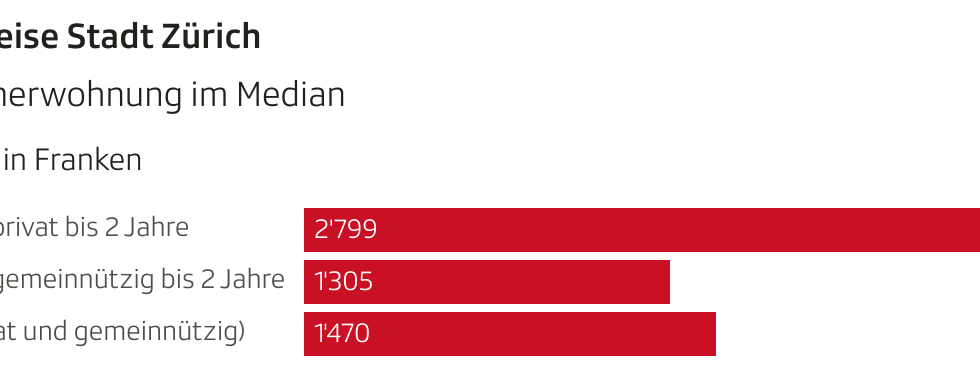Contents
A 4.5-room apartment for 5,000 francs? No exception in Zurich. Prices are also rising in other cities.
In the city of Zurich, rental prices have risen by 40 percent within 20 years. And the trend in other cities and agglomerations is also heading in the same direction. Partly responsible: tight supply, rising land prices – and new buildings instead of renovations. A blatant example of the latter is the Heuried settlement in Zurich. All residents of the 108 apartments were given notice – because the settlement had to make way for a new building.
“The houses are in such good condition, that can’t be right,” says Daniel Naef, a long-time tenant. And for Liliane Forster it is clear why the settlement is being demolished: “It’s the profit.” Your 3.5-room maisonette apartment costs 2,500 francs gross per month. A very reasonable price for the location.
New apartments will probably be massively more expensive
The developer guarantees those who have been terminated an apartment in the planned new building. But: “I can’t imagine that a 3.5-room apartment of around 80 square meters will cost less than 4,000 francs,” said tenant Carsten Schütt. Probably rightly so: advertised apartments in the neighborhood are even more expensive.
The residents’ lack of understanding about the demolition is understandable: twenty years ago the six houses were completely renovated. Solar panels and new heaters were installed four years ago. From the tenants’ perspective, renovation would be far from necessary. The owner of the settlement is the CS fund Livingplus, which belongs to domestic and foreign investors.
ETH expert: Building new instead of renovating is usually less ecological
The administrator CS Asset Management writes to “Kassenjagd” that a replacement new building would be more ecological: “The property is over 80 years old and would need to be comprehensively renovated in the near future. With the new building, 41 additional apartments can be created on the same area, which will help alleviate the housing shortage in the city of Zurich.”
In Switzerland, buildings are demolished much more often than they are expanded. Investors often justify replacement new buildings by saying that they are more ecological than renovations. David Kaufmann, assistant professor of spatial development and urban policy at ETH Zurich, contradicts: “Demolition emits a lot of C02 emissions, it is very unecological to demolish and rebuild. And from a social perspective it’s not sustainable either.”
Higher rents force out the original tenants
This is because the original residents often could not afford the more expensive rents. David Kaufmann was able to prove this in the Zurich-Altstetten area. “After total renovations, you can see jumps in household income of 3,500 francs per month. This means that those who now live in the completely renovated apartment earn around 3,500 francs more per household.” So much more wealthy tenants moved in than had previously lived there.
Back to the Heuried settlement: Building owner CS Asset Management writes about the planned new building: “The rental prices will be within the usual market range for new buildings in District 3.” Susanne Haug cannot afford such prices. The pensioner living on the AHV pays 1,250 francs net for her 54 square meter two-room apartment.
She has written several letters to UBS CEO Sergio Ermotti, to the CS and to the Federal Council. Without success. The situation makes her almost desperate. “I just can’t cope with moving out of here. And finding something comparable that you can afford is actually impossible.”
